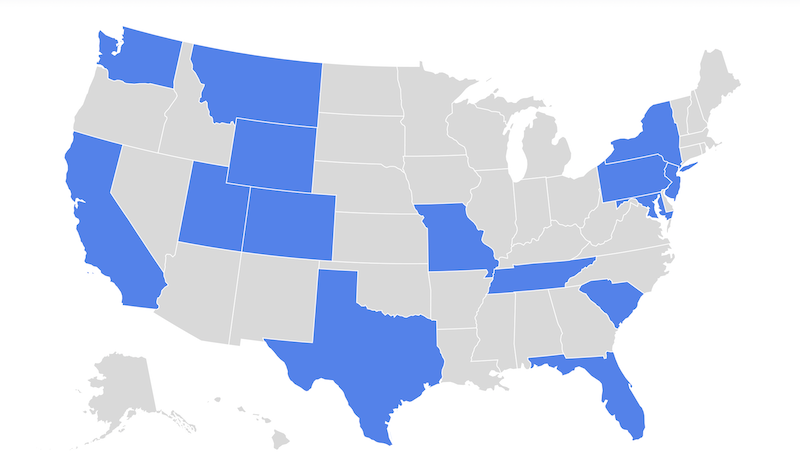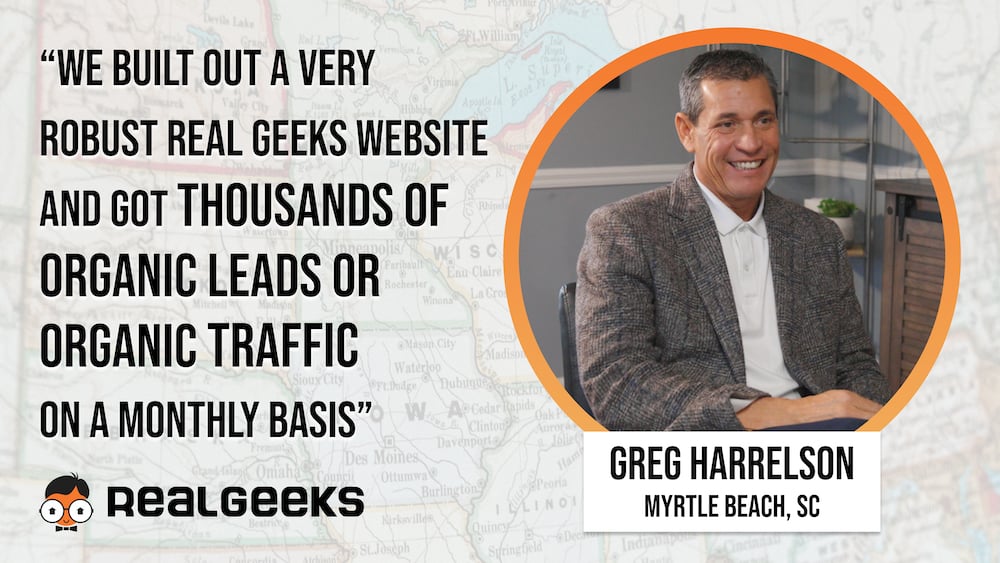
In a recent episode of "Keeping it Real," we had the pleasure of engaging in a captivating dialogue with Kevin McCarthy, the CEO & Technical Co-founder of RealGeeks. What sets Kevin's perspective apart is the fusion of his academic background in Computer Science and Philosophy.
This unique blend equips him with a comprehensive outlook as he navigates the dynamic landscape of technology, particularly the transformative impact of Real Estate A.I. in our industry.
Kevin McCarthy: A Tech Visionary with Philosophical Insight
Kevin's journey into technology started in his formative years, fueled by an innate curiosity about its boundless possibilities. As a teenager, he immersed himself in programming, laying the groundwork for a future that seamlessly integrated his technological prowess with a profound interest in philosophy.
His collegiate path led him to Computer Science, a field that, at first glance, may seem at odds with the abstract musings of philosophy. However, Kevin's intentional decision to minor in Philosophy reveals a conscious exploration of the ethical dimensions woven into technological progress.
This dual expertise—melding the precision of coding with the contemplative nature of philosophy—becomes the canvas upon which Kevin paints a nuanced perspective on Real Estate A.I. and its far-reaching implications.
Navigating A.I.: From Philosophy to Practical Real Estate Applications
As our conversation delved into the crux of the matter, Kevin provided a succinct yet profound definition of Real Estate A.I.
He described it as "the computer's ability to think at a higher level rather than simply following exact instructions."
This perspective, influenced by his philosophical grounding, establishes the groundwork for understanding A.I. not merely as a tool but as a transformative force reshaping the interaction between computers and the world.
The discussion progressed to explore the various types of A.I.
From Machine Learning A.I., where machines undergo training on diverse scenarios, enabling them to learn and respond based on accumulated experiences.
To Large Language Models, exemplified by ChatGPT, showcased the capability of Real Estate A.I. to generate human-like language based on input.
Kevin also touched upon Image-based A.I., underscoring the versatility of these technological advancements.
The Turing Test Revisited: Real Estate A.I. in Historical Context
Imagine the following scenario: in a room, there are two computer terminals.
A human interacts with these terminals, posing questions or engaging in conversation. One of the terminals is connected to another human, while the other is linked to a computer.
If the person interacting cannot reliably distinguish which terminal is connected to the human and which to the computer, the computer is deemed to have passed the Turing Test, signifying a level of artificial intelligence that mirrors human cognition.
We have reached that point.
We have arrived at a point where computers exhibit intelligence comparable to humans—a realization that also highlights the rapid evolution of Real Estate A.I.
And realtors can use this to their advantage. Kevin underscores the accessibility of creating personalized Real Estate A.I. thanks to platforms like OpenAI.
These platforms provide APIs that empower individuals, regardless of coding expertise, to shape the future of Real Estate A.I. by creating prototypes through plain English instructions.
Real Estate A.I. in Action: Addressing Challenges in the Real Estate Realm
Given Kevin's pivotal role as the CEO & Technical Co-founder of RealGeeks, our conversation naturally gravitated toward the challenges and opportunities that Real Estate A.I. presents in the real estate industry.
A primary challenge discussed was the delicate equilibrium required in creating a robust interface that remains user-friendly. Real estate agents, often pressed for time, need tools that enhance efficiency without requiring hours upon hours of tutorials.
A compelling application of Real Estate A.I. emerged in its potential to automate tasks within the RealGeeks platform.
Kevin illustrated this with a practical example: triggering a re-engagement campaign for a specific group of contacts.
Traditionally, this task involves using a Search Advanced Filter, clicking buttons, and navigating through the process.
However, Kevin envisions a future where an agent can simply instruct the Real Estate A.I. to "Send a nice, 3-step re-engagement campaign to everyone who hasn't been active on my site in the past 60 days, but who has purchased a home with me in the last 2 years."
The A.I., intimately understanding the RealGeeks platform, not only identifies the right audience but also crafts and sends the campaign.
However, this innovative leap is not without its challenges. Kevin emphasized a common issue known as hallucination, where A.I. models, trained on internet data, might generate content with inaccuracies.
This was exemplified by the A.I. creating a property description that included features the property might not have based on patterns observed in past data.
To tackle this, Kevin introduced the concept of "Prompt Engineers''—individuals whose job will be to design and test different instructions to guide Real Estate A.I. behavior effectively.
Real Estate A.I. Tools Today: Content Generation + Speed to Lead
A substantial portion of our conversation revolved around the tools available to real estate agents today, with ChatGPT taking center stage. Kevin shared insights into its applications, emphasizing its role in aiding email composition, generating content for websites, and facilitating content recycling.
He acknowledged that while Real Estate A.I. can get users halfway there, human editing remains crucial, especially for nuanced content.
Kevin proposed a practical approach to leverage ChatGPT. Users could provide it source material, such as a transcript from a video, and instruct it to build an actionable blog post or a YouTube description based on that.
This content recycling approach underscores the potential for Real Estate A.I. to streamline content creation processes.
The second great use of real estate A.I.? Making sure all your leads are contacted immediately and nobody slips through the cracks.
That's exactly why Kevin built the Geek A.I. Assistant. The tool contacts your leads while you're not around using research-backed seller and buyer scripts, and lets you know exactly when you need to take over once it detects a deal is on its way.
Save time qualifying leads, set more appointments, and sleep peacefully knowing that every lead is being engaged with at all times.
Addressing Concerns: Copyright and Data Privacy in the Real Estate A.I. Landscape
As with any technological advance, concerns inevitably arise. Kevin tackled potential copyright issues, noting that Real Estate A.I. models like ChatGPT constantly pull from various sources.
This raises a concern that users might inadvertently be perceived as "stealing" content. Additionally, there's ambiguity about the extent to which tech vendors handle user data when inputting information into A.I. models.
Kevin advised caution, particularly with sensitive data like financial information, urging users to be mindful of what they share.
The Future Horizon: Artificial General Intelligence (AGI) and Beyond Real Estate A.I.
The conversation took a futuristic turn with the introduction of Artificial General Intelligence (AGI).
Kevin described AGI as more than a language model—it's a form of intelligence that can improve on itself.
Drawing a comparison to the self-updating capabilities depicted in movies like Terminator, he acknowledged that while we are far from achieving true AGI, the historical adaptability of humanity to technological shifts positions us well to navigate the future.
Can Real Estate A.I. Sell a House? The Human Touch in the Age of Technological Advancements
In the concluding segment, Kevin addressed a question that lingers in the minds of many—can Real Estate A.I. sell a house?
His response was unequivocal: "Not as it exists today."
Kevin emphasized that, if anything, human connection is becoming more valuable in certain industries.
While precision tasks, like surgeries, might lean towards automation, decisions driven by nuance and human emotion, such as buying a home, are likely to continue requiring a human touch.
Kevin McCarthy: Bridging the Technical and Ethical in Real Estate A.I.
In wrapping up our exploration into the intersection of Real Estate A.I. and real estate with Kevin McCarthy, it's evident that his background in both computer science and philosophy enriches this discussion.
While many agents worry about how A.I. might mean the end of their careers, we want to remind you of the tailors who were afraid of the sewing machines.
If anything, automation has made the clothing industry more prolific and its growth more exponential. At the end of the day, the sewing machine generated a far greater number of jobs than it replaced.
Call us optimistic, but that's what we believe will happen with real estate A.I.
Real Geeks is a highly efficient and effective lead generation and conversion solution for cultivating, capturing, and managing leads at any stage of the home buying or selling process.
Drive traffic, capture leads, nurture opportunities, and close more transactions with a robust CRM, fully integrated custom IDX website, and marketing solutions for agents and teams of any size.
Real Geeks is one of the best lead generation and management platforms available, but don't just take our word for it – hear from customers loving their experience with Real Geeks →





/Blog/Thumbnail%20-%20Emerging%20Brokers%20Time%20to%20Build%20Your%20Engine.png)
/Blog/Thumbnail%20-%20Automation%20That%20Frees%20Agents%20to%20Do%20What%20They%20Signed%20Up%20For.png)
/Blog/Thumbnail%20-%20Choice%2c%20Freedom%2c%20and%20the%20Power%20of%20a%20Platform.png)